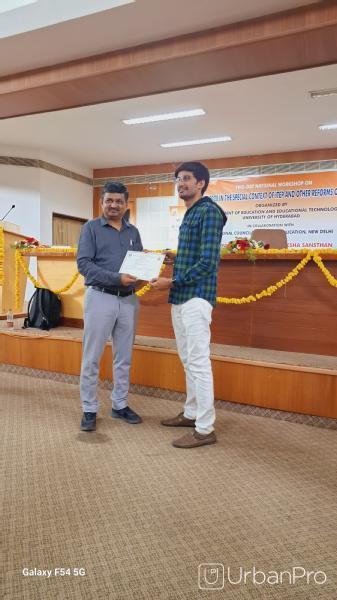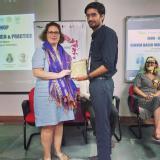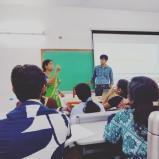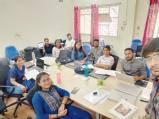
Featured
CUC, Gachibowli, Hyderabad, India - 500046.
Verified
2
Details verified of Pranav Kumar Dwivedi✕
 Identity
Identity
 Education
Education
Know how UrbanPro verifies Tutor details
Identity is verified based on matching the details uploaded by the Tutor with government databases.







+1 more
Bhojpuri Mother Tongue (Native)
Hindi Mother Tongue (Native)
English Basic
![]() University of hydrabad
Pursuing
University of hydrabad
Pursuing
Master of Education (M.Ed.)
![]() Mahatma gandhi kashi vidyapith, varanshi
2017
Mahatma gandhi kashi vidyapith, varanshi
2017
Bachelor of Science (B.Sc.)
![]() JNCU, ballia, UP
2022
JNCU, ballia, UP
2022
Bachelor of Education (B.Ed.)
 NIELT
2019
NIELT
2019
C++
 CBSE
2021
CBSE
2021
Tecaher eligibility test
 NTA
2023
NTA
2023
UGC NET
CUC, Gachibowli, Hyderabad, India - 500046
![]() ID Verified
ID Verified
![]() Education Verified
Education Verified
![]() Phone Verified
Phone Verified
![]() Email Verified
Email Verified
A
Arbor International School
Kondapur, Hyderabad
Report this Profile
Is this listing inaccurate or duplicate? Any other problem?
Please tell us about the problem and we will fix it.
Class Location
![]() Online (video chat via skype, google hangout etc)
Online (video chat via skype, google hangout etc)
![]() Student's Home
Student's Home
![]() Tutor's Home
Tutor's Home
Years of Experience in Class 10 Tuition
5
Board
NIOS, CBSE, IGCSE, ICSE
Preferred class strength
One on one/ Private Tutions
Experience in School or College
During my time in high school I had it really good moments, but my best moments that I've experienced are in a particular class during my senior year, in Sacramento, Calif. So I was basically a new student in these kind of classes and also I'm English learner. I remember my first presentation in this class. I didn't want to do it, but finally I did it and that one was my best moment. When I went to present I felt afraid, and then when I presented I felt so good for the effort I applied on. Now I feel so much better than my first day of presentations because I now know that I can do whatever I want to do. The learnings that I acquire made it so good this moment because I know that I have to trust on me. Something teachers or students can learn from my experience is that we have to overcome our fears and not let them control ourselves because we can't know our capabilities if we are afraid.
Subjects taught
History and Civics, Geography, Physics, History, Social Science, Mathematics, Hindi, Political Science, Chemistry, EVS, Science
Taught in School or College
Yes
Class Location
![]() Online (video chat via skype, google hangout etc)
Online (video chat via skype, google hangout etc)
![]() Student's Home
Student's Home
![]() Tutor's Home
Tutor's Home
Years of Experience in Class 11 Tuition
5
Board
State, International Baccalaureate, CBSE, ISC/ICSE, IGCSE, AS/A levels, NIOS
Preferred class strength
Group Classes, One on one/ Private Tutions
Experience in School or College
I have an experience of 5 years as a tutor. I generally deal with kids and students, depending on their grasping level. I mostly try to interact with them ...
Subjects taught
Physics, Psycology, Political Science, Social science, History, Hindi Language, Mathematics, Geography, Home Science, Philosophy, Psychology, EVS, Hindi, Education, English, Chemistry
Taught in School or College
Yes
Class Location
![]() Online (video chat via skype, google hangout etc)
Online (video chat via skype, google hangout etc)
![]() Student's Home
Student's Home
![]() Tutor's Home
Tutor's Home
Years of Experience in Class 12 Tuition
5
Board
CBSE, ISC/ICSE
Preferred class strength
One on one/ Private Tutions
Subjects taught
Geography, Physics, History, Political Science, Chemistry, Hindi
Taught in School or College
No
Class Location
![]() Online (video chat via skype, google hangout etc)
Online (video chat via skype, google hangout etc)
![]() Student's Home
Student's Home
![]() Tutor's Home
Tutor's Home
Years of Experience in Class 9 Tuition
5
Board
NIOS, International Baccalaureate, CBSE, IGCSE, ICSE, State
Preferred class strength
Group Classes, One on one/ Private Tutions
Subjects taught
Social Science, Hindi, Science, Geography, History, Physics, Chemistry, Mathematics, Biology
Taught in School or College
Yes
Class Location
![]() Online (video chat via skype, google hangout etc)
Online (video chat via skype, google hangout etc)
![]() Student's Home
Student's Home
![]() Tutor's Home
Tutor's Home
Years of Experience in Class 8 Tuition
5
Board
ICSE, International Baccalaureate, DAV board, CBSE, State, NIOS, IGCSE
Preferred class strength
Group Classes, One on one/ Private Tutions
Subjects taught
Mathematics, Geography, Hindi, History, English, EVS, Biology, Chemistry, Social science, Physics, Science
Taught in School or College
Yes
Class Location
![]() Online (video chat via skype, google hangout etc)
Online (video chat via skype, google hangout etc)
![]() Student's Home
Student's Home
![]() Tutor's Home
Tutor's Home
Years of Experience in Class 7 Tuition
5
Board
ICSE, CBSE
Subjects taught
Science, Hindi, EVS, Mathematics
Taught in School or College
Yes
Class Location
![]() Online (video chat via skype, google hangout etc)
Online (video chat via skype, google hangout etc)
![]() Student's Home
Student's Home
![]() Tutor's Home
Tutor's Home
Years of Experience in Class 6 Tuition
5
Board
ICSE, CBSE
Subjects taught
Hindi, Geography, Biology, Chemistry, Social science, Political Science, Science, Mathematics, History, Physics, EVS
Taught in School or College
Yes
Class Location
![]() Online (video chat via skype, google hangout etc)
Online (video chat via skype, google hangout etc)
![]() Student's Home
Student's Home
![]() Tutor's Home
Tutor's Home
Class Location
![]() Online (video chat via skype, google hangout etc)
Online (video chat via skype, google hangout etc)
![]() Student's Home
Student's Home
![]() Tutor's Home
Tutor's Home
Years of Experience in NEET-UG Coaching Classes
3
NEET Subjects
Chemistry, Biology, Physics
Teaching Experience in detail in NEET-UG Coaching Classes
"I have 4 years of experience teaching Chemistry for NEET-UG. I’ve worked with reputed coaching institutes , where I handled both theory and problem-solving sessions. My teaching focuses on NCERT concepts, application-based questions, and regular MCQ practice. I’ve mentored several students who scored above 600, and some secured seats in top government medical colleges.
Class Location
![]() Online (video chat via skype, google hangout etc)
Online (video chat via skype, google hangout etc)
![]() Student's Home
Student's Home
![]() Tutor's Home
Tutor's Home
Years of Experience in Spoken English classes
4
Age groups catered to
16 yrs to 25 yrs
Levels of Spoken English I teach
Advanced, Basic
Country Name
Britain
Lived or Worked in English Speaking Country
Yes
Awards and Recognition
No
Certification
None
Name
Defodil international school
Profession
Tutor
Language of instruction offered
English to English, Hindi to English
Curriculum Expertise
ICSE/ISC, CBSE, State
Citizen of English Speaking Country
Yes
Years of stay in English Speaking Country
2
Class strength catered to
One on one/ Private Tutions
Teaching done in
Basic Spoken English, English Grammar, Vocabulary
Teaching at
School
5 out of 5 2 reviews
Mamatha Javaraiah
Class 8 Tuition Board of Education:CBSE CBSE Subject:English,Hindi,Mathematics,Sanskrit,Science,Social Science
"He teaches very well.he can prepare you for any test, compitition exam or even the syllabus. He also makes it very easy to understand anything he teaches "
Palak Verma
Class 10 Tuition Board of Education:CBSE Preferred class strength:One on one/ Private Tutions CBSE Subject:English,Mathematics,Science,Social science
"Excellent tutor, was very thorough and took careful measures in understanding the concepts in a very convenient manner, uses multiple resources for easy teaching. "
1. Which school boards of Class 10 do you teach for?
NIOS, CBSE, IGCSE and others
2. Do you have any prior teaching experience?
Yes
3. Which classes do you teach?
I teach B Ed Tuition, Class 10 Tuition, Class 11 Tuition, Class 12 Tuition, Class 6 Tuition, Class 7 Tuition, Class 8 Tuition, Class 9 Tuition, NEET-UG Coaching and Spoken English Classes.
4. Do you provide a demo class?
Yes, I provide a free demo class.
5. How many years of experience do you have?
I have been teaching for 5 years.
Answered 3 days ago Learn CBSE/Class 11/Science/Physics
Answered on 12/06/2024 Learn CBSE/Class 11/Science/Chemistry
Electrocyclic reactions are a type of pericyclic reaction where a conjugated polyene undergoes a reversible, intramolecular cyclization to form a cyclic compound, or vice versa. These reactions involve the redistribution of π-electrons and can be classified as either thermal or photochemical, depending on the energy source that drives the reaction.
Key features of electrocyclic reactions include:
1.Cyclic Transition State: The reaction proceeds through a cyclic transition state where the π-electrons reorganize.
2.Conservation of Orbital Symmetry:The reaction adheres to the Woodward-Hoffmann rules, which dictate that the symmetry of the molecular orbitals must be conserved. For thermal reactions, the process follows a conrotatory mechanism (rotating in the same direction) or disrotatory mechanism (rotating in opposite directions), depending on the number of π-electrons involved.
3.Stereospecificity:The stereochemistry of the starting material influences the stereochemistry of the product due to the concerted nature of the reaction.
Examples:
1-Cyclobutene to Butadiene (and vice versa): This reaction is a classic example where a four-membered ring (cyclobutene) opens to form butadiene.
2-Hexatriene to Cyclohexadiene (and vice versa):A six-membered ring can form from hexatriene via an electrocyclic reaction.
Applications:Electrocyclic reactions are important in organic synthesis and are utilized in the construction of complex cyclic structures. They also play a role in biological processes and the behavior of certain natural products.
Understanding the mechanisms and conditions that favor either conrotatory or disrotatory pathways allows chemists to predict and control the outcomes of these reactions, making them valuable tools in synthetic organic chemistry.
Answered on 16/01/2024 Learn CBSE/Class 10/Mathematics/UNIT II: Algebra
Answered on 16/01/2024 Learn CBSE/Class 10/Mathematics/UNIT II: Algebra
Yes, linear algebra is crucial for engineering. It provides a fundamental framework for solving systems of equations, analyzing transformations, and understanding the behavior of vectors and matrices, which are essential in various engineering applications such as control systems, signal processing, and structural analysis.
Answered on 15/01/2024 Learn CBSE/Class 10/Mathematics/UNIT II: Algebra
linear algebra deals with vector spaces and linear transformations, often used in solving systems of linear equations. Calculus, on the other hand, focuses on rates of change and accumulation. They are related as calculus uses some linear algebra concepts, especially when dealing with multivariable functions and systems of equations in the context of solving real-world problems.
Class Location
![]() Online (video chat via skype, google hangout etc)
Online (video chat via skype, google hangout etc)
![]() Student's Home
Student's Home
![]() Tutor's Home
Tutor's Home
Years of Experience in Class 10 Tuition
5
Board
NIOS, CBSE, IGCSE, ICSE
Preferred class strength
One on one/ Private Tutions
Experience in School or College
During my time in high school I had it really good moments, but my best moments that I've experienced are in a particular class during my senior year, in Sacramento, Calif. So I was basically a new student in these kind of classes and also I'm English learner. I remember my first presentation in this class. I didn't want to do it, but finally I did it and that one was my best moment. When I went to present I felt afraid, and then when I presented I felt so good for the effort I applied on. Now I feel so much better than my first day of presentations because I now know that I can do whatever I want to do. The learnings that I acquire made it so good this moment because I know that I have to trust on me. Something teachers or students can learn from my experience is that we have to overcome our fears and not let them control ourselves because we can't know our capabilities if we are afraid.
Subjects taught
History and Civics, Geography, Physics, History, Social Science, Mathematics, Hindi, Political Science, Chemistry, EVS, Science
Taught in School or College
Yes
Class Location
![]() Online (video chat via skype, google hangout etc)
Online (video chat via skype, google hangout etc)
![]() Student's Home
Student's Home
![]() Tutor's Home
Tutor's Home
Years of Experience in Class 11 Tuition
5
Board
State, International Baccalaureate, CBSE, ISC/ICSE, IGCSE, AS/A levels, NIOS
Preferred class strength
Group Classes, One on one/ Private Tutions
Experience in School or College
I have an experience of 5 years as a tutor. I generally deal with kids and students, depending on their grasping level. I mostly try to interact with them ...
Subjects taught
Physics, Psycology, Political Science, Social science, History, Hindi Language, Mathematics, Geography, Home Science, Philosophy, Psychology, EVS, Hindi, Education, English, Chemistry
Taught in School or College
Yes
Class Location
![]() Online (video chat via skype, google hangout etc)
Online (video chat via skype, google hangout etc)
![]() Student's Home
Student's Home
![]() Tutor's Home
Tutor's Home
Years of Experience in Class 12 Tuition
5
Board
CBSE, ISC/ICSE
Preferred class strength
One on one/ Private Tutions
Subjects taught
Geography, Physics, History, Political Science, Chemistry, Hindi
Taught in School or College
No
Class Location
![]() Online (video chat via skype, google hangout etc)
Online (video chat via skype, google hangout etc)
![]() Student's Home
Student's Home
![]() Tutor's Home
Tutor's Home
Years of Experience in Class 9 Tuition
5
Board
NIOS, International Baccalaureate, CBSE, IGCSE, ICSE, State
Preferred class strength
Group Classes, One on one/ Private Tutions
Subjects taught
Social Science, Hindi, Science, Geography, History, Physics, Chemistry, Mathematics, Biology
Taught in School or College
Yes
Class Location
![]() Online (video chat via skype, google hangout etc)
Online (video chat via skype, google hangout etc)
![]() Student's Home
Student's Home
![]() Tutor's Home
Tutor's Home
Years of Experience in Class 8 Tuition
5
Board
ICSE, International Baccalaureate, DAV board, CBSE, State, NIOS, IGCSE
Preferred class strength
Group Classes, One on one/ Private Tutions
Subjects taught
Mathematics, Geography, Hindi, History, English, EVS, Biology, Chemistry, Social science, Physics, Science
Taught in School or College
Yes
Class Location
![]() Online (video chat via skype, google hangout etc)
Online (video chat via skype, google hangout etc)
![]() Student's Home
Student's Home
![]() Tutor's Home
Tutor's Home
Years of Experience in Class 7 Tuition
5
Board
ICSE, CBSE
Subjects taught
Science, Hindi, EVS, Mathematics
Taught in School or College
Yes
Class Location
![]() Online (video chat via skype, google hangout etc)
Online (video chat via skype, google hangout etc)
![]() Student's Home
Student's Home
![]() Tutor's Home
Tutor's Home
Years of Experience in Class 6 Tuition
5
Board
ICSE, CBSE
Subjects taught
Hindi, Geography, Biology, Chemistry, Social science, Political Science, Science, Mathematics, History, Physics, EVS
Taught in School or College
Yes
Class Location
![]() Online (video chat via skype, google hangout etc)
Online (video chat via skype, google hangout etc)
![]() Student's Home
Student's Home
![]() Tutor's Home
Tutor's Home
Class Location
![]() Online (video chat via skype, google hangout etc)
Online (video chat via skype, google hangout etc)
![]() Student's Home
Student's Home
![]() Tutor's Home
Tutor's Home
Years of Experience in NEET-UG Coaching Classes
3
NEET Subjects
Chemistry, Biology, Physics
Teaching Experience in detail in NEET-UG Coaching Classes
"I have 4 years of experience teaching Chemistry for NEET-UG. I’ve worked with reputed coaching institutes , where I handled both theory and problem-solving sessions. My teaching focuses on NCERT concepts, application-based questions, and regular MCQ practice. I’ve mentored several students who scored above 600, and some secured seats in top government medical colleges.
Class Location
![]() Online (video chat via skype, google hangout etc)
Online (video chat via skype, google hangout etc)
![]() Student's Home
Student's Home
![]() Tutor's Home
Tutor's Home
Years of Experience in Spoken English classes
4
Age groups catered to
16 yrs to 25 yrs
Levels of Spoken English I teach
Advanced, Basic
Country Name
Britain
Lived or Worked in English Speaking Country
Yes
Awards and Recognition
No
Certification
None
Name
Defodil international school
Profession
Tutor
Language of instruction offered
English to English, Hindi to English
Curriculum Expertise
ICSE/ISC, CBSE, State
Citizen of English Speaking Country
Yes
Years of stay in English Speaking Country
2
Class strength catered to
One on one/ Private Tutions
Teaching done in
Basic Spoken English, English Grammar, Vocabulary
Teaching at
School
5 out of 5 2 reviews
Mamatha Javaraiah
Class 8 Tuition Board of Education:CBSE CBSE Subject:English,Hindi,Mathematics,Sanskrit,Science,Social Science
"He teaches very well.he can prepare you for any test, compitition exam or even the syllabus. He also makes it very easy to understand anything he teaches "
Palak Verma
Class 10 Tuition Board of Education:CBSE Preferred class strength:One on one/ Private Tutions CBSE Subject:English,Mathematics,Science,Social science
"Excellent tutor, was very thorough and took careful measures in understanding the concepts in a very convenient manner, uses multiple resources for easy teaching. "
Answered 3 days ago Learn CBSE/Class 11/Science/Physics
Answered on 12/06/2024 Learn CBSE/Class 11/Science/Chemistry
Electrocyclic reactions are a type of pericyclic reaction where a conjugated polyene undergoes a reversible, intramolecular cyclization to form a cyclic compound, or vice versa. These reactions involve the redistribution of π-electrons and can be classified as either thermal or photochemical, depending on the energy source that drives the reaction.
Key features of electrocyclic reactions include:
1.Cyclic Transition State: The reaction proceeds through a cyclic transition state where the π-electrons reorganize.
2.Conservation of Orbital Symmetry:The reaction adheres to the Woodward-Hoffmann rules, which dictate that the symmetry of the molecular orbitals must be conserved. For thermal reactions, the process follows a conrotatory mechanism (rotating in the same direction) or disrotatory mechanism (rotating in opposite directions), depending on the number of π-electrons involved.
3.Stereospecificity:The stereochemistry of the starting material influences the stereochemistry of the product due to the concerted nature of the reaction.
Examples:
1-Cyclobutene to Butadiene (and vice versa): This reaction is a classic example where a four-membered ring (cyclobutene) opens to form butadiene.
2-Hexatriene to Cyclohexadiene (and vice versa):A six-membered ring can form from hexatriene via an electrocyclic reaction.
Applications:Electrocyclic reactions are important in organic synthesis and are utilized in the construction of complex cyclic structures. They also play a role in biological processes and the behavior of certain natural products.
Understanding the mechanisms and conditions that favor either conrotatory or disrotatory pathways allows chemists to predict and control the outcomes of these reactions, making them valuable tools in synthetic organic chemistry.
Answered on 16/01/2024 Learn CBSE/Class 10/Mathematics/UNIT II: Algebra
Answered on 16/01/2024 Learn CBSE/Class 10/Mathematics/UNIT II: Algebra
Yes, linear algebra is crucial for engineering. It provides a fundamental framework for solving systems of equations, analyzing transformations, and understanding the behavior of vectors and matrices, which are essential in various engineering applications such as control systems, signal processing, and structural analysis.
Answered on 15/01/2024 Learn CBSE/Class 10/Mathematics/UNIT II: Algebra
linear algebra deals with vector spaces and linear transformations, often used in solving systems of linear equations. Calculus, on the other hand, focuses on rates of change and accumulation. They are related as calculus uses some linear algebra concepts, especially when dealing with multivariable functions and systems of equations in the context of solving real-world problems.

Share this Profile
Also have a look at
Reply to 's review
Enter your reply*
Your reply has been successfully submitted.
Certified
The Certified badge indicates that the Tutor has received good amount of positive feedback from Students.